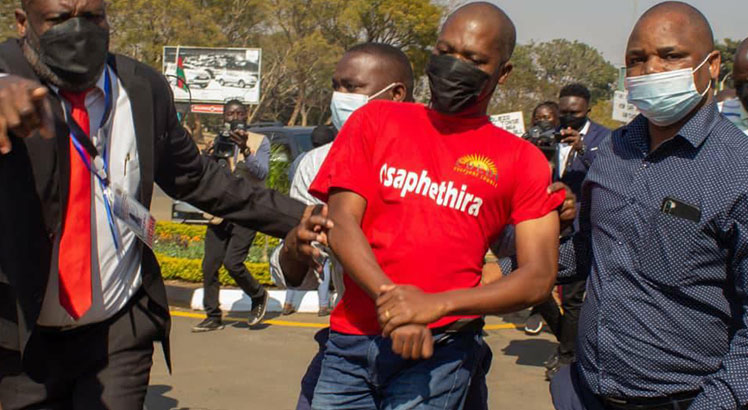MHRC to probe activist’s arrest, torture
Malawi Human Rights Commission (MHRC) will probe the arrest of Centre for Democracy and Development Initiatives (Cdedi) executive director Sylvester Namiwa amid reports that he was tortured while in police custody.
In a statement signed by MHRC chairperson Scader Louis, the commission also condemned the arrest and asked the commissioner of the Independent Police Complaints Commission to investigate the matter.
Reads the statement in part: “All the actions for manhandling him and denying him bail were unnecessary and uncalled for. These actions are contrary to the police reforms that have been championed for decades.”

Namiwa was arrested last Thursday in Lilongwe for allegedly holding illegal protests.
Plain-clothed police picked him outside Parliament Building where his organisation was holding a vigil to force Parliament leadership to explain how a Loan Authorisation Bill of K93 billion found itself on the Order Paper—an outline of issues to be discussed in Parliament—without approval of and knowledge of key stakeholders, including Cabinet.
Namiwa’s organisation proceeded with the planned vigil despite Lilongwe City Council not granting him permission citing security as the country was scheduled to host the Southern African Development Community (Sadc) Summit and the worsening Covid-19 situation.
But according to MHRC’s statement issued yesterday, preliminary investigations surrounding Namiwa’s arrest show a number of human rights violations.
MHRC said the activist was arrested for exercising his right to a demonstration and that he was roughed up in the process.
The statement said police were only compelled to stop the vigils and not arrest Namiwa and that denying his relatives, including his lawyer, to communicate with him was unjustified.
Further, the statement said MHRC’s preliminary investigations show that Namiwa was put in a solitary cell at Lilongwe Police Station and in leg irons as if he was a dangerous criminal, which was inhumane and a violation of Section 42 of the Constitution.
Section 42 of the country’s Constitution stipulates that every arrested person must be held under conditions that are consistent with human dignity.
Besides, the statement also faulted police for not releasing the activist on bail the same day stressing that such actions were unnecessary and uncalled for.
The MHRC statement has since asked the office of the Inspector General (IG) of Police to explain the human rights violations that Namiwa suffered in the hands of police.
National Police spokesperson James Kadadzera declined to comment both on the report and progress of police reforms that were aimed at restoring public trust and giving the police a human face.
He said: “His [Namiwa] matter is in court so I am not obliged to comment on anything for now as well as the police reforms.”
Namiwa, who was arrested alongside 10 others, was released on bail by the Nkukula Magistrate’s Court in Lilongwe on Thursday.
University of Malawi political science lecturer Mustapha Hussein said the human rights violations as observed by the MHRC suggest that police have a long way to go in respecting human rights.
He said the situation casts doubts if police are knowledgeable about their role in promoting human rights in the country, further calling on the Tonse Alliance administration to tread carefully on such matters.
Said Hussein: “The Tonse Alliance administration, particularly led by the Malawi Congress Party [MCP] must tread carefully because it would remind Malawians that the country is slowly sliding to the old autocratic ways which will eventually lead to the loss of trust from Malawians. So, they have to treat such matters sensitively.”
In a separate interview, Mzuzu University-based political analyst Chrispine Mphande, however faulted Namiwa for proceeding with the vigil at a time the country was to start hosting the Sadc summit.
Efforts to engage Minister of Information Gospel Kazako, who is also the official government spokesperson, proved futile as he could not be reached on his known mobile number, and neither did he respond to our message,
But in September last year, IG George Kainja expressed regret that police officers have lost public trust because they have been indulging in unprofessional acts like criminality and selective justice.
Speaking when he met members of quasi-religious group Public Affairs Committee in Lilongwe, Kainja declared that under his leadership every police officer will be required to strictly adhere to the rule of law, professionalism and to handle the citizenry humanely, in reforms that should regain public trust for the police service.





